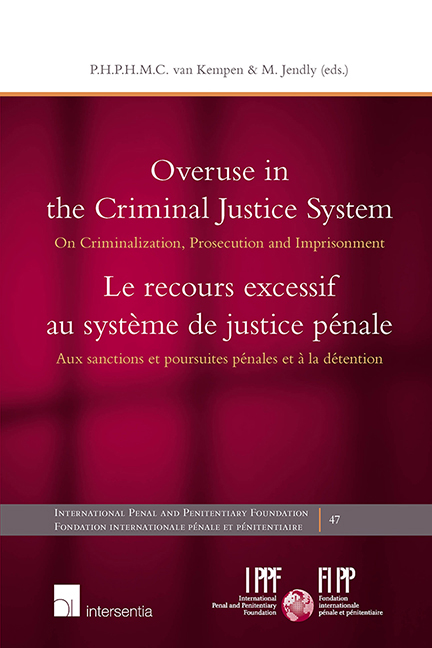Book contents
- Frontmatter
- Dedication
- Contents
- Acknowledgements
- Remerciements
- PART I INTRODUCTORY SYNTHESIS AND ANALYSES 1ÈRE PARTIE. SYNTHÈSE ET ANALYSES INTRODUCTIVES
- PART II THEMES 2ÈME PARTIE. THÈMES
- PART III NATIONAL REPORTS 3ÈME PARTIE. RAPPORTS NATIONAUX
- Overuse in the Criminal Justice System in Argentina
- Le recours au système de justice pénale en Belgique: état des lieux et perspectives
- Overuse of Criminal Law in Finland
- Overuse in the Criminal Justice System in Germany
- Overuse in the Criminal Justice System in Greece
- Overusing the Criminal Justice System: the Case of Ireland
- Overuse in the Criminal Justice System in Japan
- Tendencies of Overuse in Criminal Law Policy and Criminal Law Enforcement in the Netherlands
- Overuse in the Criminal Justice System in New Zealand
- Overuse in the Criminal Justice System in Nigeria
- Overuse in the Criminal Justice System in Poland
- Overuse in the Russian Criminal Justice System
- Overuse in the Criminal Justice System in Spain
- Recourt-on de manière excessive au système pénal en Suisse?
- Overuse of the Criminal Justice System in Taiwan
- Overuse and Underuse of the United States Criminal Justice System in the Area of Business Crimes
- The International Penal and Penitentiary Foundation: history and purpose
- La Fondation internationale pénale et pénitentiaire: histoire et objectif
- The IPPF Series
Overuse in the Criminal Justice System in Japan
from PART III - NATIONAL REPORTS 3ÈME PARTIE. RAPPORTS NATIONAUX
Published online by Cambridge University Press: 26 June 2019
- Frontmatter
- Dedication
- Contents
- Acknowledgements
- Remerciements
- PART I INTRODUCTORY SYNTHESIS AND ANALYSES 1ÈRE PARTIE. SYNTHÈSE ET ANALYSES INTRODUCTIVES
- PART II THEMES 2ÈME PARTIE. THÈMES
- PART III NATIONAL REPORTS 3ÈME PARTIE. RAPPORTS NATIONAUX
- Overuse in the Criminal Justice System in Argentina
- Le recours au système de justice pénale en Belgique: état des lieux et perspectives
- Overuse of Criminal Law in Finland
- Overuse in the Criminal Justice System in Germany
- Overuse in the Criminal Justice System in Greece
- Overusing the Criminal Justice System: the Case of Ireland
- Overuse in the Criminal Justice System in Japan
- Tendencies of Overuse in Criminal Law Policy and Criminal Law Enforcement in the Netherlands
- Overuse in the Criminal Justice System in New Zealand
- Overuse in the Criminal Justice System in Nigeria
- Overuse in the Criminal Justice System in Poland
- Overuse in the Russian Criminal Justice System
- Overuse in the Criminal Justice System in Spain
- Recourt-on de manière excessive au système pénal en Suisse?
- Overuse of the Criminal Justice System in Taiwan
- Overuse and Underuse of the United States Criminal Justice System in the Area of Business Crimes
- The International Penal and Penitentiary Foundation: history and purpose
- La Fondation internationale pénale et pénitentiaire: histoire et objectif
- The IPPF Series
Summary
INTRODUCTION
If asked whether there is any considerable “overuse” in the criminal justice system, an average criminal judge or prosecutor in Japan will probably answer, “I don't think so”, or, “I've never thought of that.” Some defence lawyers or bar associations may argue that there is overuse of arrest or pre-trial detention, but I doubt that they feel there is any serious problem of overuse of criminalization, prosecution or imprisonment. Similar replies can be expected from lawmakers and drafters, and they may add, “We are very cautious with criminal law legislation. We are always exercising utmost care in order to prevent such problem from arising.” As I will discuss below, statistics do not show any notable signs or symptoms of any serious overuse.
Although there may be dissenting opinions, it seems to me that the problem of overuse in the criminal justice system has not, at least so far, become a major concern in the Japanese society. Overuse seems to have been fairly well controlled. But having been exposed to this question on this occasion, I started thinking that Japan may have simply been lucky. Few people think that there is overuse in the criminal justice system, but is Japan really qualified to say that the current situation is something that has been achieved by conscious efforts to avoid unwanted overuse? Isn't the fairly satisfying situation just a coincidental result of a combination of different factors, environment or, maybe, legal or social tradition? So I do not dare to say that Japan has consciously controlled the problem of overuse and succeeded, and I do not deny the potential risk of overuse that may rise at any time in the future. However, I would like to say that, currently, there seems to be no major concern about overuse, and there have surely been a variety of elements in the criminal justice system and practice that led to this favourable situation. Taking a quick look at those elements may still be worthwhile.
OVERUSE OF CRIMINALIZATION
Under the Constitution of Japan, there are currently 1,959 laws in force (as of 1 December 2015) out of which some 940 laws carry penal provisions.
- Type
- Chapter
- Information
- Overuse in the Criminal Justice SystemOn Criminalization, Prosecution and Imprisonment, pp. 417 - 430Publisher: IntersentiaPrint publication year: 2019



